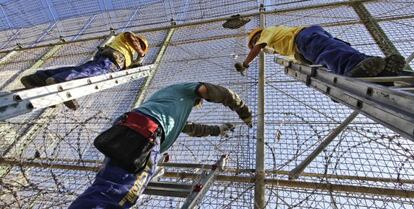Attorney general orders probe into razor wire on Melilla border
Decision to add formidable obstacle “not in line with the law” says Torres-Dulce

The attorney general, Eduardo Torres-Dulce, has ordered an investigation into the decision of the Melilla authorities to add a layer of razor wire to the top of a section of the border fence between the Spanish exclave and Morocco. The measure was adopted in the face of sustained and multitudinous attempts by would-be immigrants to rush the fence during the course of the year. In a recent attempt, a man was killed falling from the top of the barrier.
Speaking on Tuesday at the Congressional Justice Committee to present his department’s annual report, Torres-Dulce said that the addition of razor wire to the six-meter border fence is not “a course of action in line with the law” or compliant with “questions of humanity.”
The attorney general was answering a question posed by Catalan Republican Left deputy Joan Tardá about what he termed the “shameful” decision to add the formidable obstacle to the fence.
The razor wire on the Melilla border was removed in 2007 by the previous Socialist government because of the terrible injuries sustained by would-be immigrants attempting to scale the fence in the wake of protests by NGOs. The cost of increasing the fence’s height from three to six meters and installing the wire was 30 million euros. Work to lay the new wire is expected to be completed by the end of the month.
Tu suscripción se está usando en otro dispositivo
¿Quieres añadir otro usuario a tu suscripción?
Si continúas leyendo en este dispositivo, no se podrá leer en el otro.
FlechaTu suscripción se está usando en otro dispositivo y solo puedes acceder a EL PAÍS desde un dispositivo a la vez.
Si quieres compartir tu cuenta, cambia tu suscripción a la modalidad Premium, así podrás añadir otro usuario. Cada uno accederá con su propia cuenta de email, lo que os permitirá personalizar vuestra experiencia en EL PAÍS.
¿Tienes una suscripción de empresa? Accede aquí para contratar más cuentas.
En el caso de no saber quién está usando tu cuenta, te recomendamos cambiar tu contraseña aquí.
Si decides continuar compartiendo tu cuenta, este mensaje se mostrará en tu dispositivo y en el de la otra persona que está usando tu cuenta de forma indefinida, afectando a tu experiencia de lectura. Puedes consultar aquí los términos y condiciones de la suscripción digital.








































